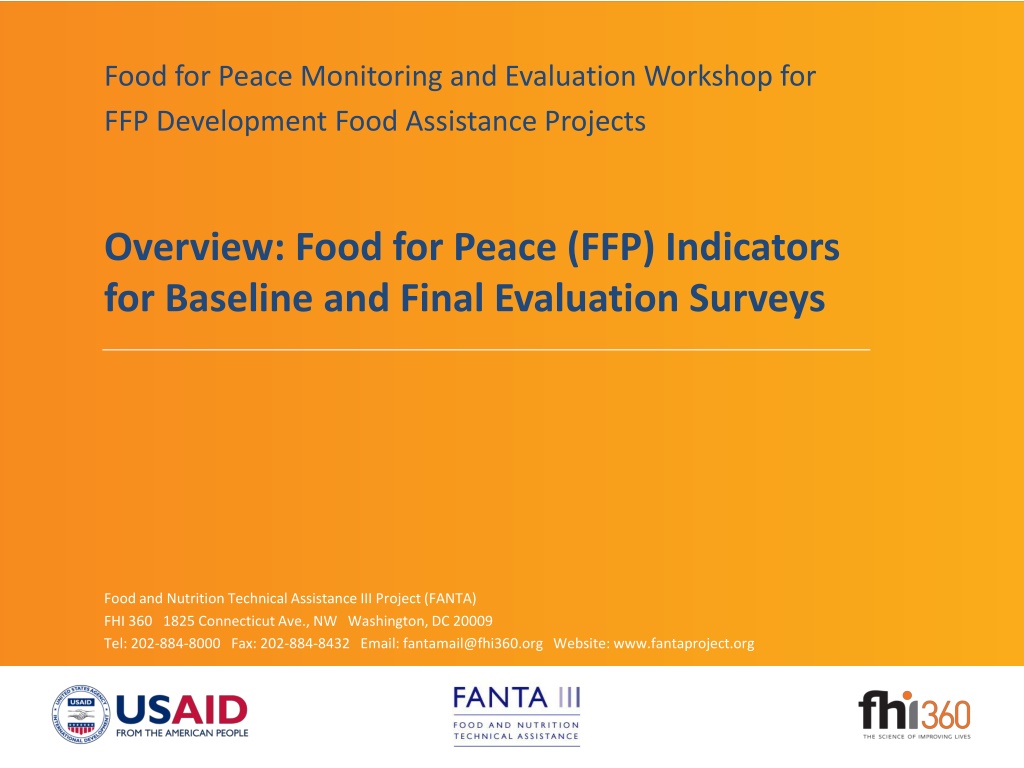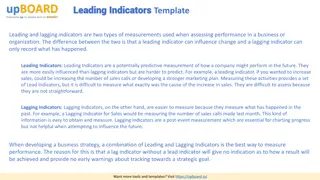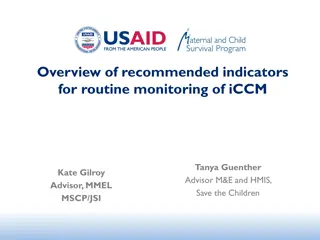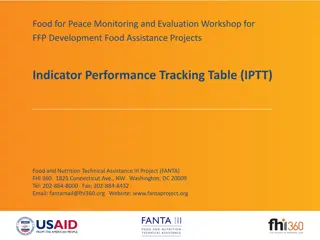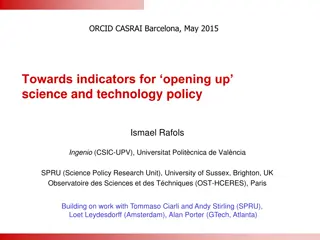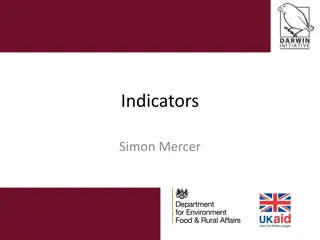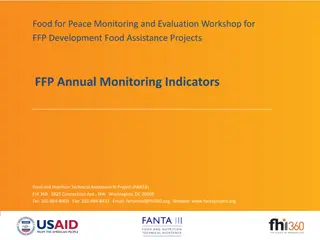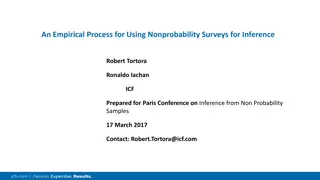Understanding Food for Peace Indicators and Evaluation Surveys
This content provides an overview of Food for Peace (FFP) indicators for baseline and final evaluation surveys, with insights on collecting and analyzing data related to key indicators such as household food access, nutrition status, WASH, agriculture, poverty, gender, and family planning. It discusses the revision of FFP indicators, data compilation by FFP, and attributes of indicators collected at baseline and annually.
Download Presentation

Please find below an Image/Link to download the presentation.
The content on the website is provided AS IS for your information and personal use only. It may not be sold, licensed, or shared on other websites without obtaining consent from the author. Download presentation by click this link. If you encounter any issues during the download, it is possible that the publisher has removed the file from their server.
E N D
Presentation Transcript
Food for Peace Monitoring and Evaluation Workshop for FFP Development Food Assistance Projects Overview: Food for Peace (FFP) Indicators for Baseline and Final Evaluation Surveys Food and Nutrition Technical Assistance III Project (FANTA) FHI 360 1825 Connecticut Ave., NW Washington, DC 20009 Tel: 202-884-8000 Fax: 202-884-8432 Email: fantamail@fhi360.org Website: www.fantaproject.org
Session Objectives By the end of the session participants will have: Shared their interest or experience collecting indicators Become familiar with the revised FFP Indicators for baseline and final evaluation surveys Identified which FFP indicators apply to their program Overview: Food for Peace (FFP) Indicators for Baseline and Final Evaluation Surveys
Your Interest/Experience Collecting and Analyzing Data for Indicators 1. Household food access 2. Children s nutritional status and feeding practices 3. Women s nutritional status and dietary diversity 4. Water, sanitation, and hygiene (WASH) 5. Agriculture (financial services, value chain activities, sustainable agricultural technologies, storage techniques) 6. Measuring poverty 7. Gender 8. Family planning Overview: Food for Peace (FFP) Indicators for Baseline and Final Evaluation Surveys
What are the FFP indicators for baseline and final evaluation surveys and why were they revised? Overview: Food for Peace (FFP) Indicators for Baseline and Final Evaluation Surveys
FFP compiles data annually from Awardees worldwide FFP/Washington DC FFP/Washington DC Overview: Food for Peace (FFP) Indicators for Baseline and Final Evaluation Surveys
FFP Indicators Overview: Food for Peace (FFP) Indicators for Baseline and Final Evaluation Surveys
Attributes of indicators collected at baseline and final Attributes of indicators collected annually Impact/Outcome Outcome/Output Baseline/Final Annual Population Beneficiary Overview: Food for Peace (FFP) Indicators for Baseline and Final Evaluation Surveys
How are FFP indicators for baseline and final evaluation surveys collected and who collects them? FFP indicators for baseline and final evaluation surveys must be collected through population-based surveys A third-party firm will conduct baseline and final evaluation surveys for FY2014 awards PVOs will report FFP indicator data to FFP Overview: Food for Peace (FFP) Indicators for Baseline and Final Evaluation Surveys
Activity 1: FFP Indicators (per category) Take 5 minutes to read the indicators over by yourself. Then form groups of 3 or 4 people and take 8 additional minutes to identify the indicators that you are not familiar with and discuss what you think they are about. Overview: Food for Peace (FFP) Indicators for Baseline and Final Evaluation Surveys
Are all FFP indicators required? Two categories: Required Required if applicable Overview: Food for Peace (FFP) Indicators for Baseline and Final Evaluation Surveys
FFP Indicators Handbook (baseline/final evaluation data) Overview: Food for Peace (FFP) Indicators for Baseline and Final Evaluation Surveys
Activity 2: Identification of Applicable FFP Indicators for Your Project Form groups based on project team Using the list of FFP indicators in the handout provided to you, arrive at a consensus with your team members on which FFP indicators are applicable for your project and place a check next to the applicable indicators Overview: Food for Peace (FFP) Indicators for Baseline and Final Evaluation Surveys
Resources FFP Indicators Handbook: http://pdf.usaid.gov/pdf_docs/PNADZ580.pdf FANTA Indicator Guides Household Dietary Diversity Score for Measurement of Household Food Access: http://www.fantaproject.org/downloads/pdfs/HDDS_v2_Sep06.pdf Household Hunger Scale: Indicator Definition and Measurement Guide: http://www.fantaproject.org/monitoring-and-evaluation/household-hunger-scale-hhs Anthropometric Indicators Measurement Guide: http://www.fantaproject.org/tools/anthropometry-guide WHO Indicators for Assessing Infant and Young Child Feeding Practices, Parts I and II: http://www.who.int/nutrition/publications/infantfeeding/9789241596664/en/ Handbook of FTF Indicators Definitions: http://feedthefuture.gov/resource/feed-future- handbook-indicator-definitions Demographic and Health Surveys Tabulation Plan for DHS Final Report: http://dhsprogram.com/publications/publication-DHSM6-DHS-Questionnaires-and-Manuals.cfm Access and Behavioral Outcome Indicators for Water, Sanitation, and Hygiene (Hygiene Improvement Project): http://www.hip.watsan.net/page/4148 Overview: Food for Peace (FFP) Indicators for Baseline and Final Evaluation Surveys
This presentation is made possible by the generous support of the American people through the support of the Office of Health, Infectious Diseases and Nutrition, Bureau for Global Health; and the Office of Food for Peace, Bureau for Democracy, Conflict and Humanitarian Assistance, United States Agency for International Development (USAID), under terms of Cooperative Agreement No. AID-OAA-A-12-00005, through FANTA, managed by FHI 360. The contents are the responsibility of FHI 360 and do not necessarily reflect the views of USAID or the United States Government. Overview: Food for Peace (FFP) Indicators for Baseline and Final Evaluation Surveys
